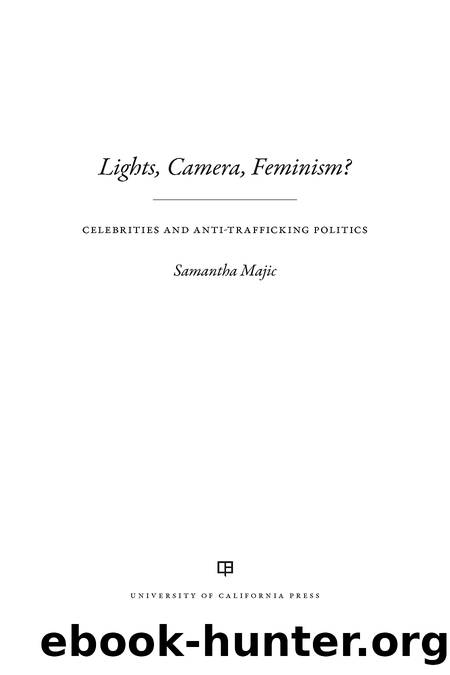Lights, Camera, Feminism? by Prof. Samantha Majic

Author:Prof. Samantha Majic
Language: eng
Format: epub
ISBN: 9780520384880
Publisher: University of California Press
In February 2007, on a warm Friday night, Ricky Martin gave a two-hour concert in San Juan, Puerto Rico. According to the local press, the concert was an average Ricky Martin show, nothing all that remarkable, with one particular exception: while singing the song âAsignatura Pendiente,â .â.â. the usually well-behaved Martin proceeded to make an obscene gesture with his hand .â.â. during a specific line in the song about having his picture taken with President Bush. To be more precise, Ricky Martin showed the middle finger of his left hand when he sang President Bushâs last name.â.â.â. When news about his uncharacteristic behavior at the February concert surfaced in the U.S., Martin released a statement to the press explaining that by flipping off the President he was condemning the war in Iraq. In his words: âMy convictions of peace and life go beyond any government and political agenda, and as long as I have a voice onstage and offstage, I will always condemn war and those who promulgate it.â
Certainly, celebrity disagreement with the Iraq war was not unique in 2007: on the eve of the invasion, Natalie Maines of the Dixie Chicks made her opposition loud and clear at a concert in London. But when Martin opposed the war, he did so as both an American and as a colonial subject; as such, he made âa gesture that somewhat challenges the very person/office that controls their lives from afarâ (Lugo-Lugo 2012, 73â74). Furthermore, as a man whose sexuality was constantly under scrutiny in the post-9/11 era, Martin also threatened âa stars-and-stripes flag-waving, heterosexual Whitenessâ with a gesture that many Americans read as expressing an anti-Bush and anti-American sentiment more broadly (77). Martinâs gesture both reified and complicated American hegemonic masculinity by challenging a colonial power as a âfeminizedâ (read: artistic, gay) subject.
In 2010, Martin engaged again in American sexual and colonial politics when he used his fame to reach a wider audience about LGBTQ+ equality. After he came out in 2010 on the Oprah Winfrey show, he appeared at the annual National Dinner in Washington, DC, for the Human Rights Campaign (HRC), the nationâs largest LGBTQ+ rights organization (see figure 9). When he arrived at the podium, he said to the audience, âyou heard Iâm gay, right?â and they cheered and clapped loudly. In his brief remarks, Martin honored the HRCâs commitment to âfighting for LGBT rights and equality,â telling the audience, âIâm here; it took me awhileâ (HRC 2010).
Download
This site does not store any files on its server. We only index and link to content provided by other sites. Please contact the content providers to delete copyright contents if any and email us, we'll remove relevant links or contents immediately.
The Secret History by Donna Tartt(19012)
The Social Justice Warrior Handbook by Lisa De Pasquale(12179)
Thirteen Reasons Why by Jay Asher(8878)
This Is How You Lose Her by Junot Diaz(6866)
Weapons of Math Destruction by Cathy O'Neil(6254)
Zero to One by Peter Thiel(5778)
Beartown by Fredrik Backman(5725)
The Myth of the Strong Leader by Archie Brown(5488)
The Fire Next Time by James Baldwin(5421)
How Democracies Die by Steven Levitsky & Daniel Ziblatt(5207)
Promise Me, Dad by Joe Biden(5138)
Stone's Rules by Roger Stone(5072)
A Higher Loyalty: Truth, Lies, and Leadership by James Comey(4942)
100 Deadly Skills by Clint Emerson(4908)
Rise and Kill First by Ronen Bergman(4766)
Secrecy World by Jake Bernstein(4735)
The David Icke Guide to the Global Conspiracy (and how to end it) by David Icke(4693)
The Farm by Tom Rob Smith(4498)
The Doomsday Machine by Daniel Ellsberg(4477)
